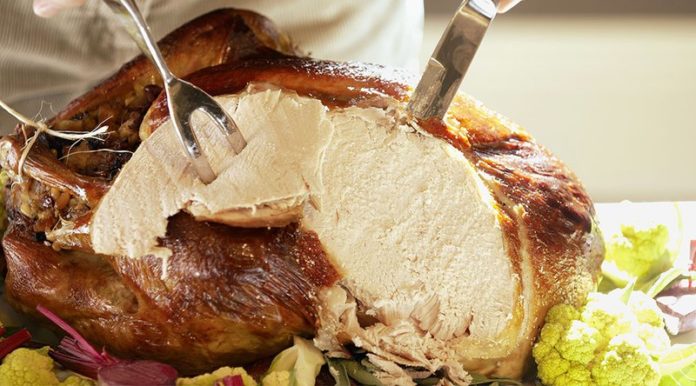
Honeysuckle White is giving family and friends gathering for Thanksgiving dinner this year the opportunity to talk turkey with a traceable blockchain code on more than 200,000 turkeys sold through 3,500 retailers around the U.S. The traceable turkeys, a limited supply of which is also available through internet retailer Amazon, offer consumers a high-tech connection to the farm where the centerpiece of the meal began its journey to the table.
The blockchain, which Honeysuckle White developed using Hyperledger’s Sawtooth platform, is intended to establish a “proven and trusted environment to build a transparent food chain, integrating farmers and producers, suppliers, processors, distributors, retailers, regulators and consumers,” according to a company release.
With more than 70 independent farms participating in Honeysuckle’s traceable turkey program, Cargill, the Minnesota-based agricultural giant owner of Honeysuckle, hopes to establish a stronger connection with consumers. While incorporating a blockchain element to the supply-and-distribution chain means the development of a data-rich environment, Cargill’s current emphasis in using the technology centers on storytelling.
Putting turkeys on the blockchain marks a deeper dive into data development for companies utilizing the technology. “Most people don’t know what we mean by it,” Deb Bauler, CIO of Cargill’s Protein and Salt Division, told Bitcoin Magazine. Rather than maintain a focus solely on data, utilization of the blockchain also opens an opportunity around a brand’s narrative.
Through a text or entering the on-package code at the Honeysuckle White site, consumers trace their turkey to its specific family farm, including the state and county of the farms, and they can also view the history and see photos of the family farm. The code also includes messages from the farmers.
Down the road, the Honeysuckle blockchain could include an Internet of Things element. This could include things such as the temperature of the truck transporting the turkeys to retail outlets.
“It’s a unique value statement,” Bauler said.
Honeysuckle, based in Wichita, Kansas, began implementing its traceable turkey program last year with a pilot that included only four farms and 60,000 birds available for the holiday season. With the successful pilot, Honeysuckle’s expansion of the program addresses consumer demand for food source transparency. Kassie Long, Honeysuckle White’s brand manager, says the company’s promotion of the product includes social media and other forms of advertising.
Thanksgiving turkey buying typically begins on the first weekend in November. As the season progresses and Honeysuckle garners retailer and consumer feedback, the company gains the ability to perform a “robust analysis” of the program on a wider scale, Long says. Included here are things like taking note of the development and strengthening of brand loyalty through repeat customers.
Still, transparency in food choice is an aspect of consumer demand familiar to Honeysuckle. According to a company release, a November 2017 survey reported 88 percent of consumers “agree that brands need to be transparent in their food production.” According to the same survey, 80 percent of consumers agree “that at Thanksgiving, it is important for their turkey to be raised by a family farmer.”
For consumers, buying blockchain-tracked food seemingly provides a kind of psychological security around food safety issues. For Honeysuckle and other traceable food providers, the security triggers a stronger bottom line through increased sales. According to a reported 2015 study conducted with consumers in South Korea, traceable information translates to more sales and increased brand and product trust.
The Food Safety Magazine story cites the study’s co-author, Rajiv Kishore, as noting that when “the customer believes regulatory authorities are ensuring accurate production information, he or she is more likely to buy food that is tracked using traceability information, and even less likely to actual use the food traceability information.”
The crux of the observation jives with the consumer research conducted by the Honeysuckle team. That is, consumers’ rising awareness around food safety weighs favorably in their buying decision. However, customers also added the caveat that they weren’t necessarily inclined to act on blockchain tracking, Long said.
Darrell Fraser, one of the original pilot participants in the Honeysuckle White traceable turkey program, says the care involved in producing more than five flocks of turkeys each year remains the same. For him, adding the blockchain element to his yields has largely translated into pursuing a kind of vanity grocery shopping. The Texas-based farmer, who has raised turkey flocks for nearly 25 years, says he has yet to find a turkey in the grocery store with roots back to his farm.
“I’ve looked and looked and still haven’t found one,” he says.
This article originally appeared on Bitcoin Magazine.

Bitcoinmagazine.com is author of this content, TheBitcoinNews.com is is not responsible for the content of external sites.
Our Social Networks: Facebook Instagram Pinterest Reddit Telegram Twitter Youtube











